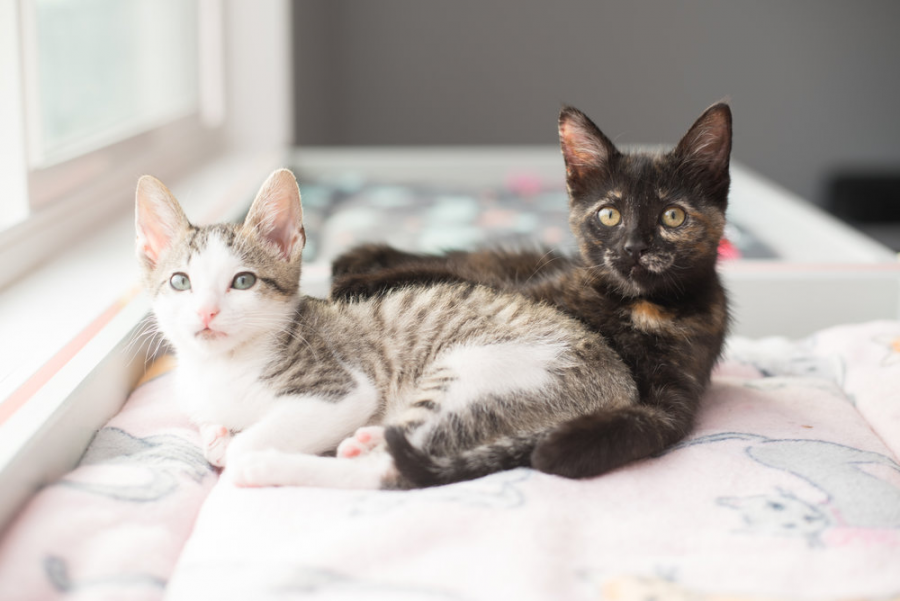Taking Care of a Kitten
Kittens can really be a handful. But with the right care, they will grow to be a very loving and affectionate animal.
I’ve always been around cats- either living with one, or visiting family members with cats. You could say I’m a very cat-loving person (or purrson, if you will.) Long-haired maine coons, short-haired bobtailed cats- any breed or size of cate can be absolutely adorable. Especially kittens; they’re so soft and tiny! They need a lot of care though, when they are so small and vulnerable.
Taking care of them is something important we should learn some important things to know how to help them thrive and be good little kitties as they age.
So, if you’re looking to adopt a kitten, wait until they’re at least 10-12 weeks of age, allowing them time to mature and not depend on their mother. Or, you can foster an orphaned/rescue kitten, since rescue organizations always get brought kittens found on the street and needed for care.
You must also be prepared for your kitten, so here is a list of items that would be necessary to caring for your kitten (“How to Care For Kittens”).
☐ Food and water bowls
☐ Course-textured 3 ft. high column/post for stretching/scratching
☐ Fun, safe toys to promote exercise (ex., wands, balls, small stuffed toys)
☐ Cat bed lined with a warm blanket or towel
☐ A grooming brush/nail clipper
☐ Cat carrier
☐ ID tag or implanted microchip (be ready for possible sneaks outs!)
Next, you’ll need to bring your kitten to a vet to be assessed- looking for ticks, illness, and basic physical assets. This is a very important step if you are fostering kittens, but still important for adopted ones. Your kitten will get vaccines, including the Distemper (treats upper respiratory viruses and panleukopenia) and Rabies vaccine. They will also be dewormed and tested for feline Leukemia and FIV. If you have a fostered kitten, you will find out their age, sex, and weight. You will also find out the time for spaying/neutering will be determined (adopted kittens usually come spayed/neutered), and a microchip may be implanted if decided by the rescue organization and you, the cat owner. (See “Caring for Your Small Kitten”, “Saving Kittens” below).
Your kitten will need a steady diet- first of formulas and wet foods for fostered kittens, then moving onto dry foods- and they need fresh, clean water.
If they’re not used to cleaning themselves yet, you may need to help teach them by washing them with a damp washrag until they do it themselves repeatedly.
Provide your kitten a scratching post so they are trained not to scratch your beloved furniture, and plenty of other toys the can play with or on (See “Caring for Your Small Kitten” below).
Something to recommend you doing is to keep your kitten in a secluded room with their toys and feeding bowls until they’ve adjusted living in your home. Slowly introduce them to your housemates and each room individually once the kitten has grown accustomed to their new environment.
Then you can watch your kitten grow! They’ll be lovely in your new home if raised well. However, if you’re only fostering your kitten, you’ll need to prepare them for adoption, information will be linked at the end. (“How to Care For Kittens”).
Now you’re ready to take care of your new fluffy kitty! Giving proper care for cats so small can determine they are for the rests of their lives, so it’s important to learn some of the best things you can do to ensure they grow up healthy and safe. If you want further information, I suggest you look at the links below or Kitten Lady’s videos on youtube (she’s great for learning about orphaned kittens or foster care!).
Looking to learn more? Check out these sites for more in-depth information!
https://bluebuffalo.com/articles/cat/how-to-take-care-of-kittens/
https://candyscats.rescuegroups.org/info/display?PageID=1101












